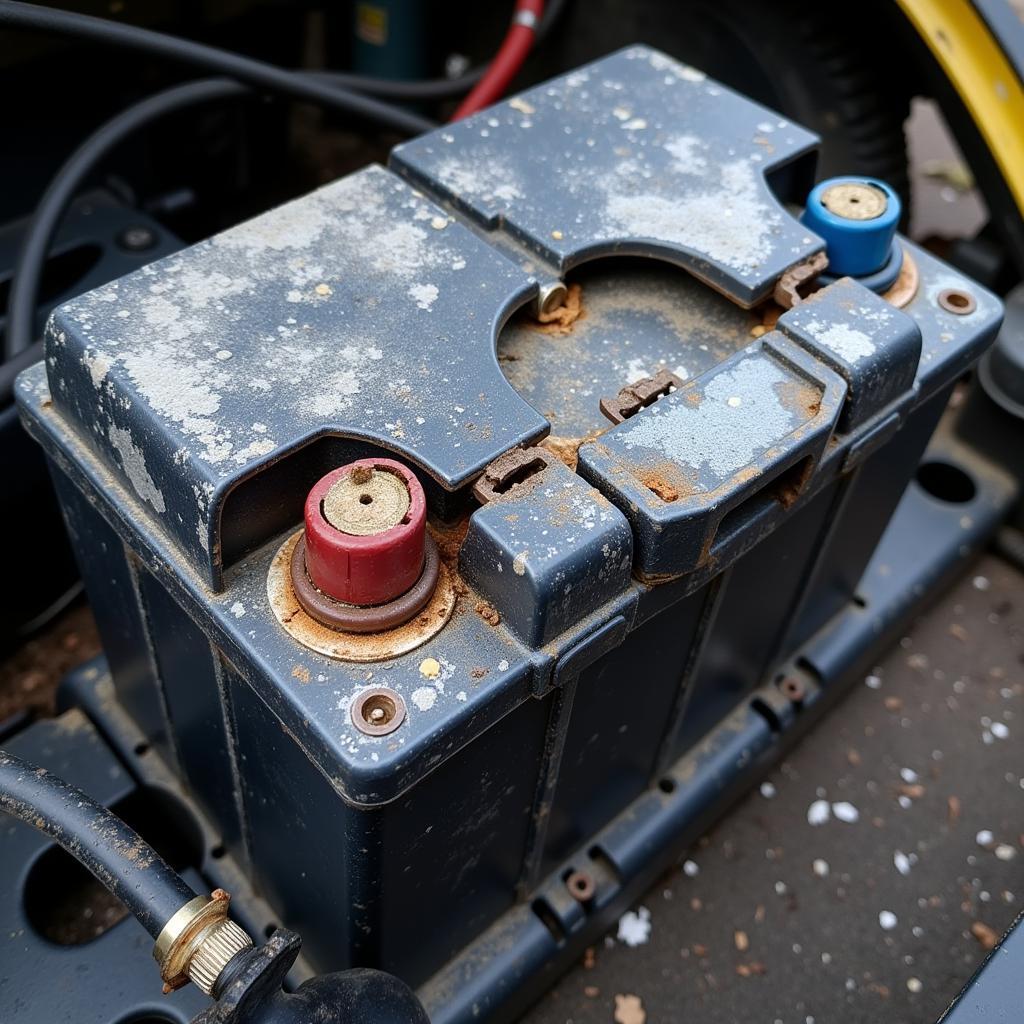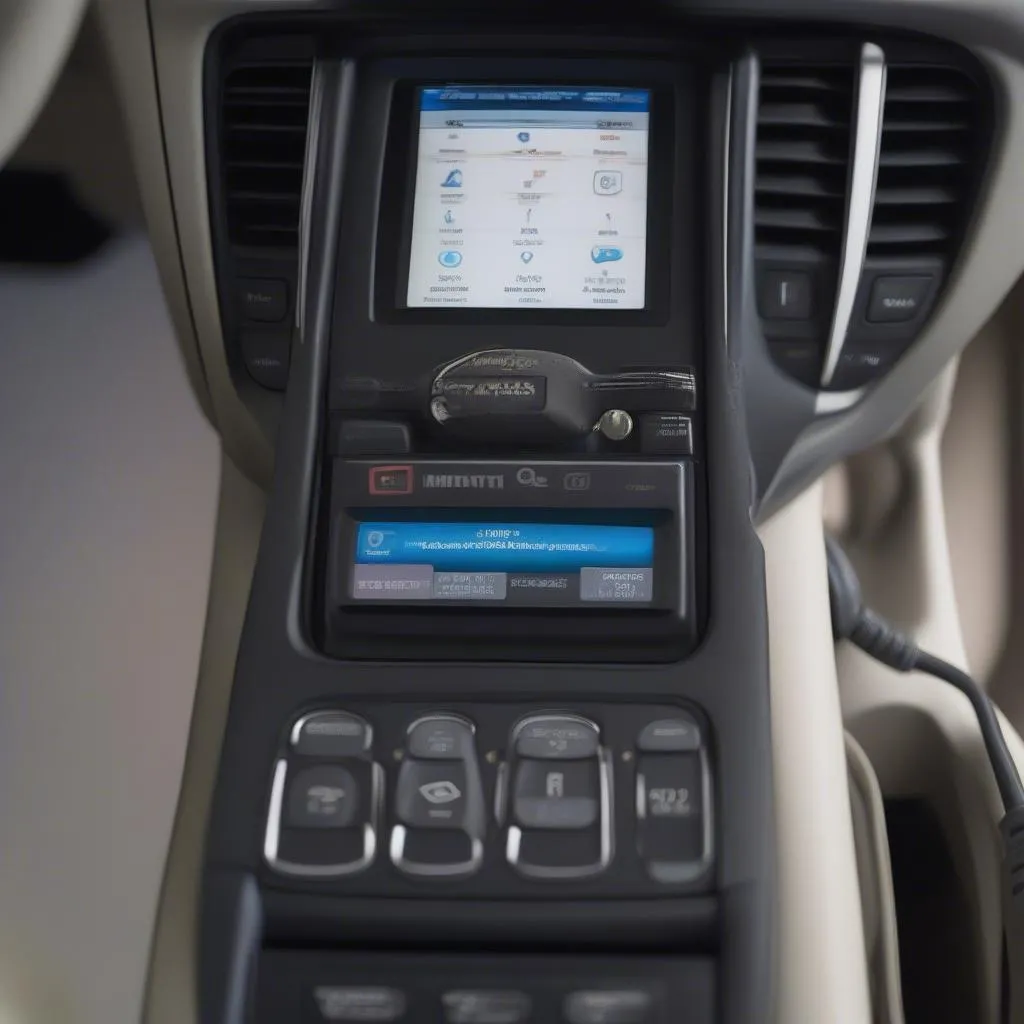A bad battery is a common culprit behind car troubles. Whether you’re dealing with a slow crank, dimming headlights, or a complete no-start, understanding how to diagnose and address a bad car battery is essential. This guide will walk you through everything you need to know about bad car batteries, from identifying the signs to finding the right solutions.
 Car Battery Showing Signs of Corrosion and Damage
Car Battery Showing Signs of Corrosion and Damage
Recognizing the Telltale Signs of a Bad Battery
Several symptoms can point towards a failing car battery. Being aware of these signs can help you address the problem before it leaves you stranded. Some common indicators include:
- Slow Cranking: The engine cranks slowly or struggles to turn over.
- Dim Headlights: Headlights appear dimmer than usual, especially when the engine is idling.
- Clicking Sound When Turning the Key: A rapid clicking sound indicates the starter motor is trying to engage but lacks sufficient power.
- Interior Lights Malfunction: Interior lights may be dim or flicker.
- Dashboard Warning Lights: The battery or check engine light may illuminate.
- Swollen Battery Case: Excessive heat can cause the battery case to swell or bulge.
If you notice your VW Passat brake pads warning light illuminated, it could be related to a failing battery affecting the electrical system. Check out this helpful resource: vw passat brake pads warning light.
Diagnosing a Bad Battery
While these symptoms can suggest a bad battery, it’s essential to confirm the diagnosis. Here are some methods to check your battery’s health:
- Visual Inspection: Check for corrosion, cracks, or leaks on the battery.
- Battery Tester: Use a multimeter or a dedicated battery tester to measure the voltage. A fully charged battery should read around 12.6 volts.
- Load Test: A load test simulates the strain on the battery during starting. This is a more accurate way to assess its condition.
What Causes a Bad Battery on Car?
Several factors can contribute to a bad battery:
- Extreme Temperatures: Both extreme heat and cold can shorten a battery’s lifespan.
- Old Age: Batteries have a limited lifespan, typically 3-5 years.
- Parasitic Drain: Electrical components drawing power even when the car is off can drain the battery.
- Overcharging/Undercharging: Problems with the charging system can damage the battery.
- Corrosion: Corrosion on the battery terminals can impede current flow.
If your 1997 Ford F150 brake warning light is on, it’s always a good idea to check the battery’s health as a potential contributing factor. You can find more information here: 1997 ford f150 brake warning light.
Solutions for a Bad Car Battery
Once you’ve confirmed a bad battery, you have a few options:
- Jump Starting: This can provide a temporary solution to get your car running, but the battery will likely need replacing soon.
- Battery Charging: A slow charge can sometimes revive a weak battery, but if the battery is old or damaged, replacement is the best option.
- Battery Replacement: Replacing the battery is the most reliable solution for a bad battery.
What Does the Parking Brake Warning Light Mean?
Sometimes, other warning lights, like the parking brake light, might appear alongside battery issues. Understanding what these mean is important. Learn more about parking brake warning lights here: what does the parking brake warning light mean.
“A weak battery can manifest in various ways, from slow starting to affecting other electrical components. Don’t ignore the signs, as a timely check can save you from unexpected breakdowns,” says Alex Walker, Senior Automotive Electrical Technician at Advanced Auto Solutions.
Conclusion
A bad battery on car can be a significant inconvenience, but by understanding the signs, symptoms, and solutions, you can effectively address the problem. Regular battery maintenance and timely replacement can help you avoid unexpected car troubles and keep your vehicle running smoothly. Remember to always consult a qualified mechanic if you’re unsure about any aspect of car battery diagnosis or replacement. Addressing a bad battery promptly can save you time, money, and frustration down the road. If you’re experiencing brake warning light issues, especially with a Jeep Cherokee, you can learn more about the brake warning pressure switch here: 2000 jeep cherokee brake warning pressure switch. For those with a Passat, check out how to reset the parking brake warning light: passat parking brake warning light reset.


